Overview
This article presents nine innovative wine tasting ideas that are specifically designed to elevate events by emphasizing personalized and engaging experiences. These concepts encompass:
- Hosting themed tastings
- Curating exquisite food pairings
- Crafting inviting atmospheres
- Integrating interactive elements
- Sharing compelling wine stories
- Leveraging the power of social media
- Providing tasting kits
- Planning future events
Each idea is aimed at fostering deeper connections with attendees and enhancing brand loyalty. By implementing these strategies, event organizers can create memorable experiences that resonate with participants and drive lasting engagement.
Introduction
Crafting a memorable wine tasting experience transcends the mere act of pouring glasses; it is about orchestrating an immersive journey that captivates the senses and fosters meaningful connections. As wineries increasingly embrace innovative Direct-to-Consumer (DTC) strategies, they unveil new avenues to engage guests through personalized events and curated experiences. Yet, a pressing challenge persists: how can wineries effectively elevate their offerings to distinguish themselves in a competitive market?
This article delves into nine creative wine tasting ideas designed not only to enhance enjoyment but also to cultivate lasting relationships with attendees, ensuring that each event leaves an indelible impression.
Enocap: Transform Your Wine Tasting Experience with DTC Strategies
Direct-to-Consumer (DTC) strategies are essential for wineries aiming to elevate their events. By fostering direct relationships with consumers, wineries can create personalized experiences that resonate profoundly with their audience. For example, Kathleen Inman of Inman Family Wines has effectively harnessed virtual programs and corporate wine-tasting events, achieving 100% DTC sales over the past four years. This success illustrates the power of tailored engagement.
Implementing DTC strategies, including demand generation and club optimization, enables wineries to collect valuable customer information that helps in developing personalized wine tasting ideas, allowing them to customize their offerings and enhance interactions during sampling. This approach not only drives immediate sales but also cultivates long-term loyalty, making it a crucial element of any successful event featuring wine tasting ideas. As Trey Busch from Sleight of Hand Cellars emphasized, boosting DTC sales through audience-participation events can significantly strengthen customer connections.
Furthermore, the surge in online wine buyers—from 1.5 million to 4.1 million—underscores the increasing significance of DTC channels in attracting new consumers. Wineries can leverage platforms like Shopify to and ensure compliance, thereby enhancing customer satisfaction. By focusing on authentic narratives and personalized marketing, wineries can create memorable engagements that foster stronger relationships with their audience, ultimately driving sustained growth in a competitive landscape. To discover how Enocap can assist you in implementing these strategies and maximizing your DTC revenue, consider scheduling a complimentary growth audit.
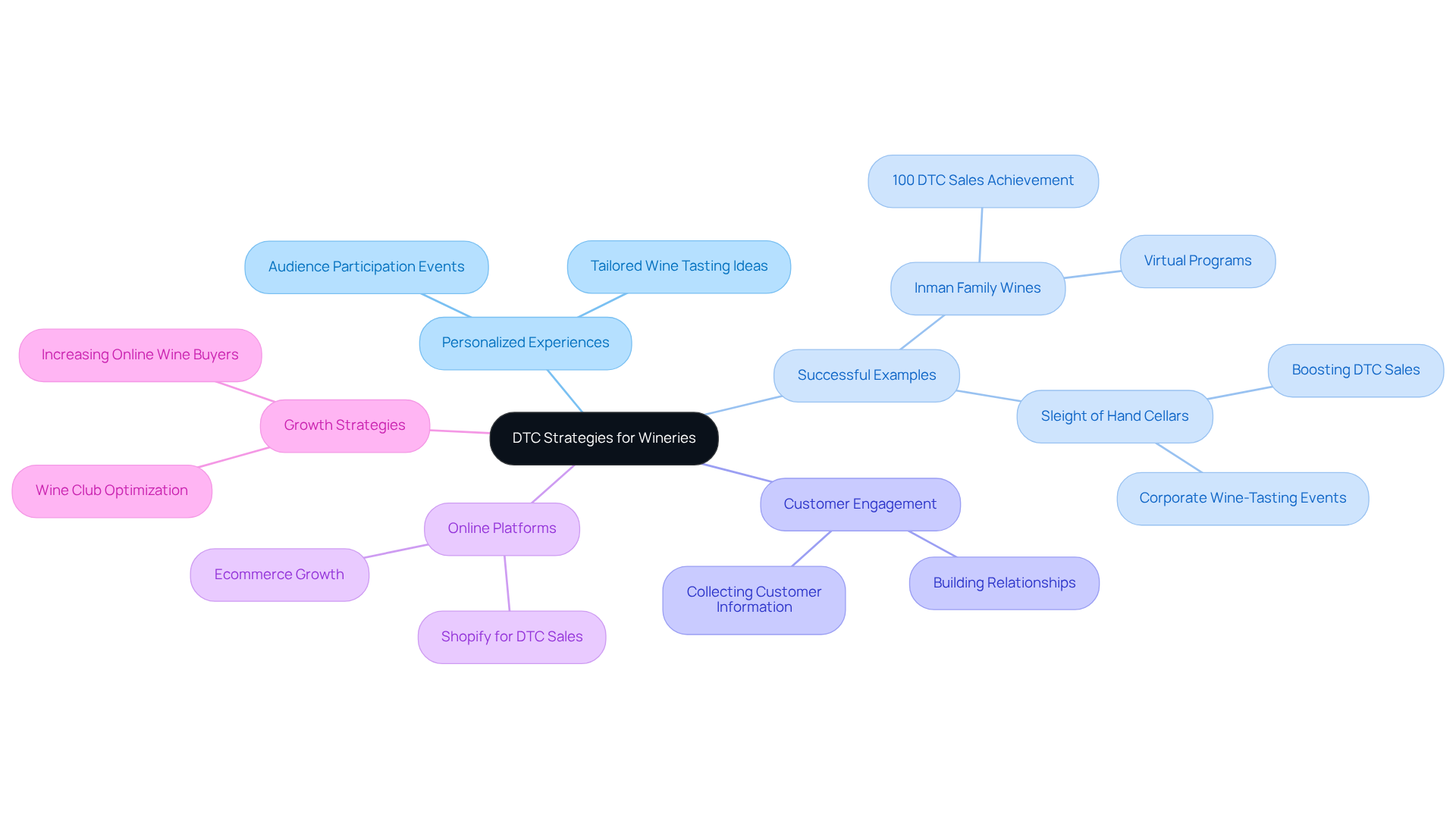
Host a Themed Wine Tasting: Explore Regional Varieties or Vintage Years
Hosting wine tasting ideas significantly elevates your visitors' enjoyment. By concentrating on regional varieties—such as Napa Valley wines compared to those from Bordeaux—or delving into the distinct characteristics of different vintage years, you provide a profound understanding of how aging influences flavor profiles. This thematic approach not only educates guests but also sparks vibrant discussions about their preferences and past experiences.
Customizing themes to align with seasonal events, holidays, or specific grape varieties introduces a distinctive twist to each occasion, providing unique wine tasting ideas that ensure it is both memorable and exciting. Moreover, incorporating , such as cheeses or charcuterie, enhances the sampled beverages, thereby enriching the overall experience.
Engaging elements, like sensory activities or blind tastings, promote visitor involvement and enjoyment, creating a lively atmosphere that encourages exploration and connection with the beverages. Finally, reaching out to attendees post-event with thank you notes or requests for feedback can further enhance their satisfaction and foster loyalty.
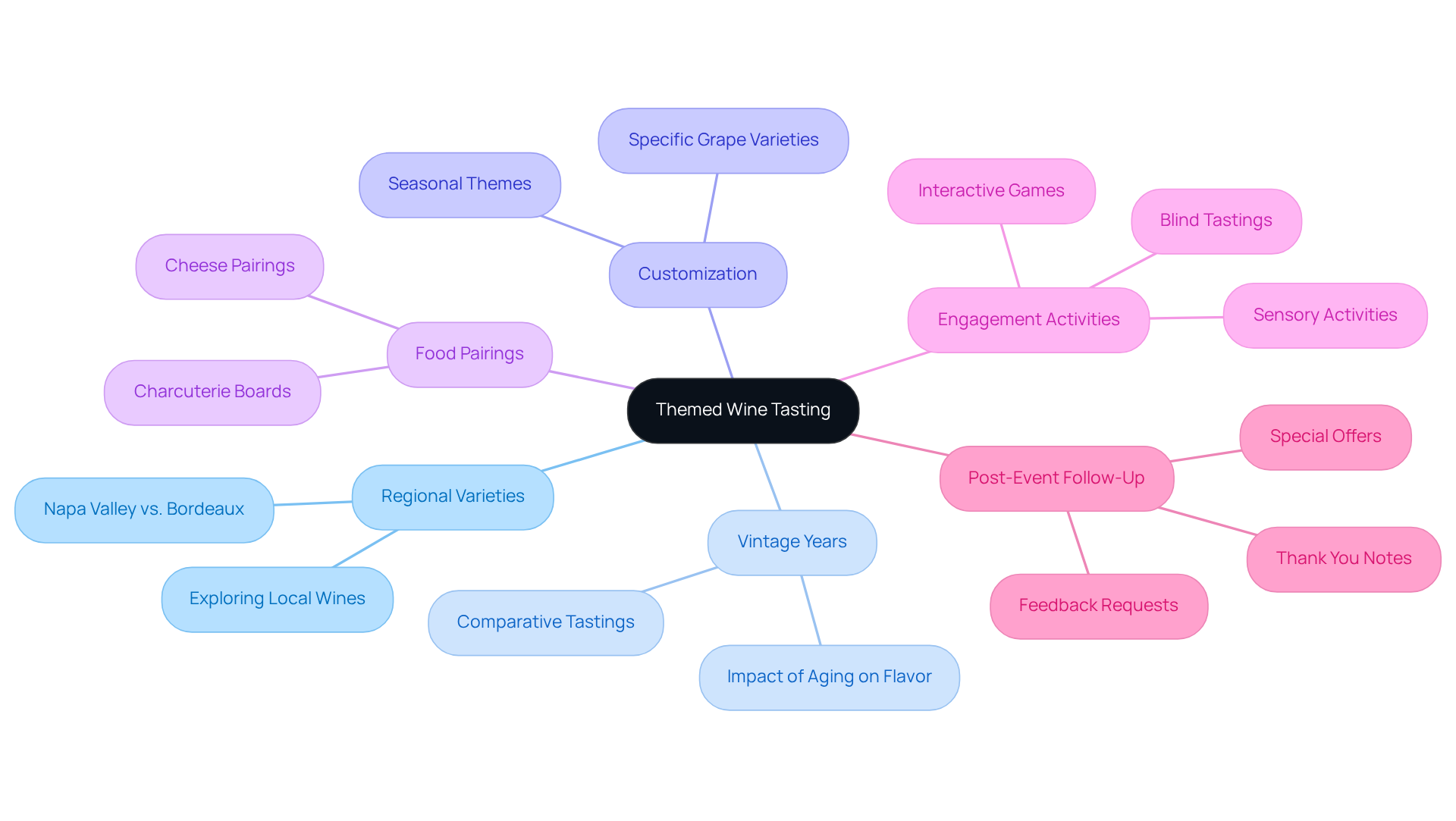
Curate Food Pairings: Match Wines with Complementary Dishes
Selecting food combinations for beverage sampling significantly enhances overall enjoyment and aligns with strategic financial planning to support these initiatives. By carefully pairing beverages with harmonious dishes, flavors are not only enhanced, but the entire experience is enriched. For instance, a robust Cabernet Sauvignon pairs exquisitely with a hearty steak, while a refreshing Sauvignon Blanc beautifully complements light seafood dishes. Offering a range of appetizers or small plates allows visitors to discover the dynamic interactions between various foods and beverages, promoting a more immersive and enjoyable tasting journey.
Case studies underscore the effectiveness of this approach. At Round Pond Estate, visitors embark on a distinctive journey that begins with a tour of their garden, followed by a curated four-course pairing of food and beverages featuring seasonal ingredients. This strengthens guests' connections to the beverages, demonstrating how food elevates enjoyment.
Furthermore, the Pairing Dinner Series at Auro, led by Executive Chef Rogelio Garcia, emphasizes seasonal ingredients and storytelling through food and beverages. Each dinner is meticulously crafted to foster unforgettable moments, underscoring the significance of food pairings in the beverage and food service industry. As Chef Garcia articulates, "For me, every menu starts with the season. I’m inspired by the textures, colors, and relationships behind each ingredient."
Incorporating these components into wine tasting ideas enables wineries to create memorable experiences that resonate with attendees, ultimately fostering loyalty and amplifying brand narratives. This approach is crucial for family-owned vintners striving to thrive in a competitive market.
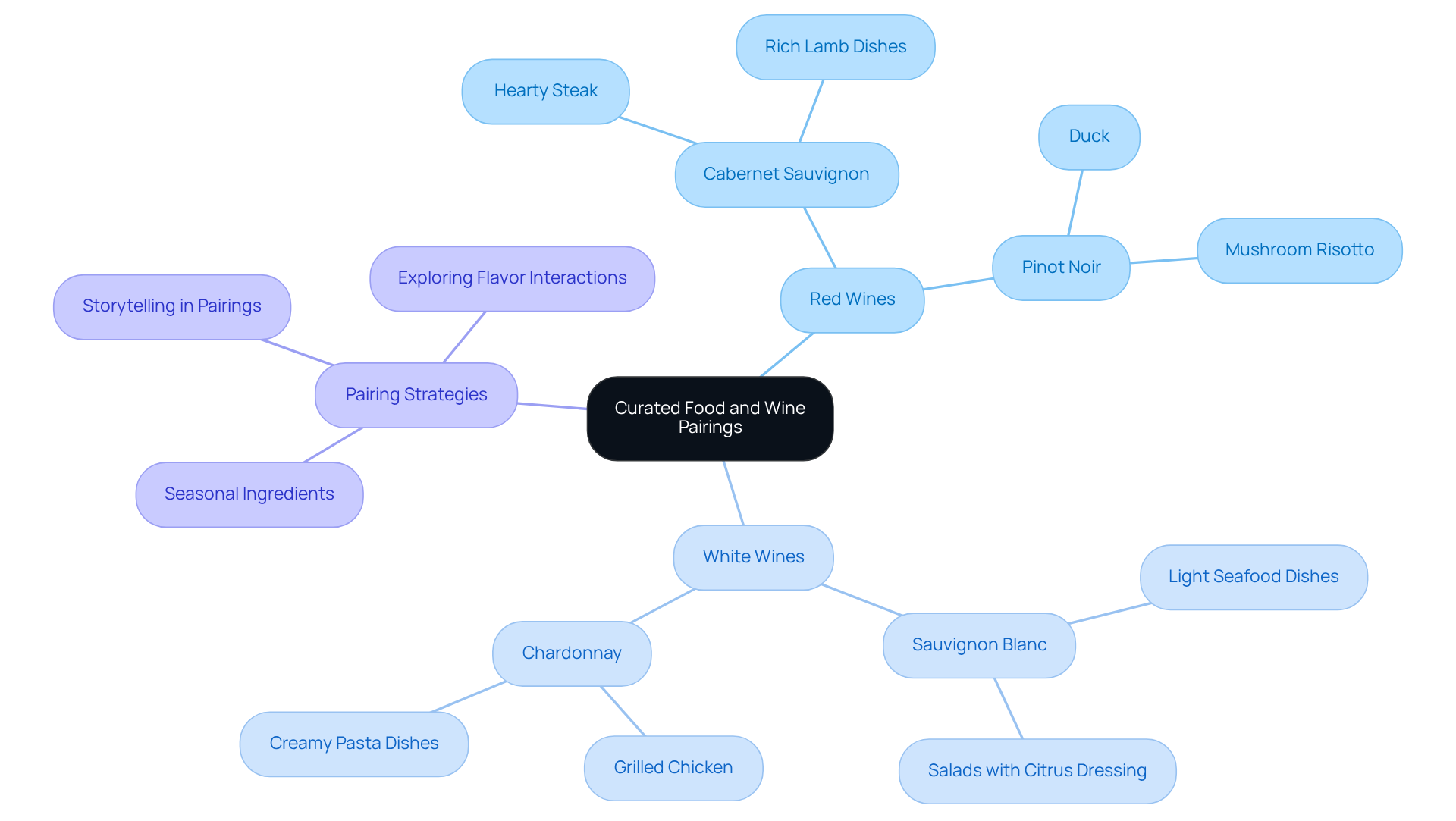
Design an Inviting Atmosphere: Use Lighting and Decor to Enhance the Experience
Establishing a welcoming environment is essential for successful wine tasting ideas. Soft lighting is pivotal in creating a warm and inviting atmosphere, while decor that aligns with the wine tasting ideas enhances the overall aesthetic. Comfortable seating arrangements and elegant table settings not only elevate the ambiance but also provide great wine tasting ideas that make visitors feel valued and appreciated. Additionally, carefully selected background music can enrich the experience of wine tasting ideas by encouraging conversation and fostering a relaxed vibe.
Case studies underscore the significant impact of these elements: at Scott Harvey Wines, the intentional arrangement of sampling areas, showcasing local character and natural materials, has been shown to enhance visitor satisfaction and promote longer stays. Research indicates that a positive atmosphere, enhanced by wine tasting ideas such as live music and thoughtfully curated decor, plays a crucial role in influencing consumer emotions and purchasing behaviors, leading to increased sales and customer loyalty.
Quotes from event planners illuminate the transformative power of decor and lighting:
- 'When ambiance and beverages come together, the result isn’t just a tasting—it’s a memory,' asserts Scott Harvey.
- Furthermore, industry leader Susan R Lin emphasizes, "The most important is to let yourself feel what your senses take in intuitively; that’s where the magic begins."
This highlights the importance of that create a sensory journey resonating with visitors, transforming each sampling into not merely an occasion, but a cherished moment.
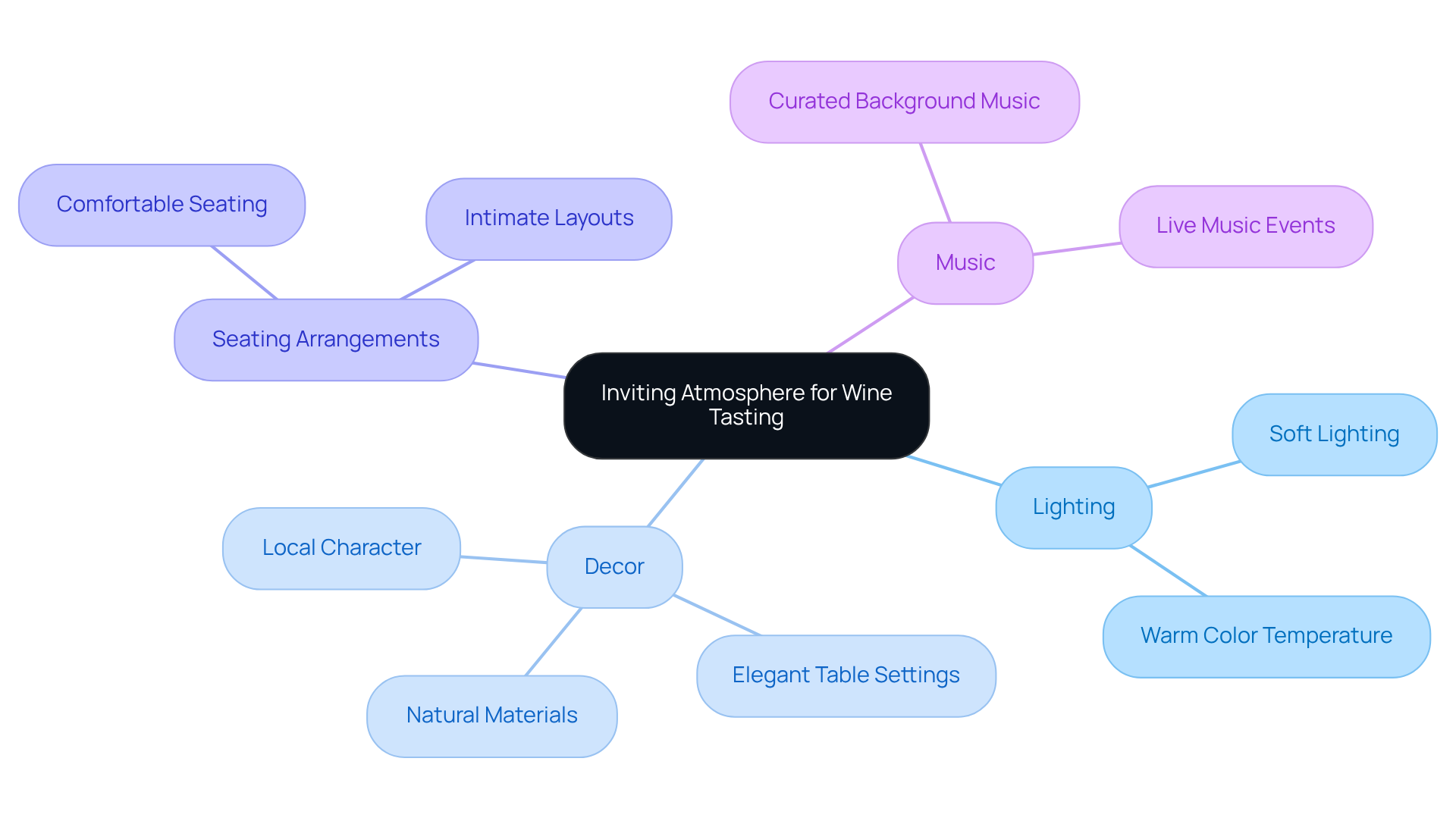
Incorporate Interactive Elements: Wine Trivia or Tasting Challenges
Enhancing guest interaction at wine tasting ideas is not just a possibility; it is a necessity for creating memorable experiences. By integrating interactive components like trivia games and tasting challenges, event planners can transform these occasions into delightful educational opportunities using creative wine tasting ideas. As Nasir Gladden aptly notes, "Beverage trivia is a fantastic method to enhance the thrill of your gathering and impress your friends with your understanding of all things related to this drink." This approach not only captivates attendees but also encourages them to identify varietals and regions of the beverages they sample.
The growing trend is evident, with studies indicating that 27% of new club registrations stem from digital platforms, underscoring the increasing enthusiasm for interactive experiences with beverages. Offering small prizes for winners not only fosters a sense of competition but also enhances the memorability of the event. Moreover, event planners have observed that incorporating wine tasting ideas and trivia ignites engaging discussions and deepens guests' appreciation for beverages, thereby elevating a standard gathering into an exceptional affair.
Successful case studies further illustrate that events featuring trivia and challenges witness heightened participation and enjoyment. This reinforces the notion that beverages serve not merely as drinks but as . By embracing these interactive elements, event planners can significantly enhance the overall experience, ensuring that each gathering is not only enjoyable but also enriching.
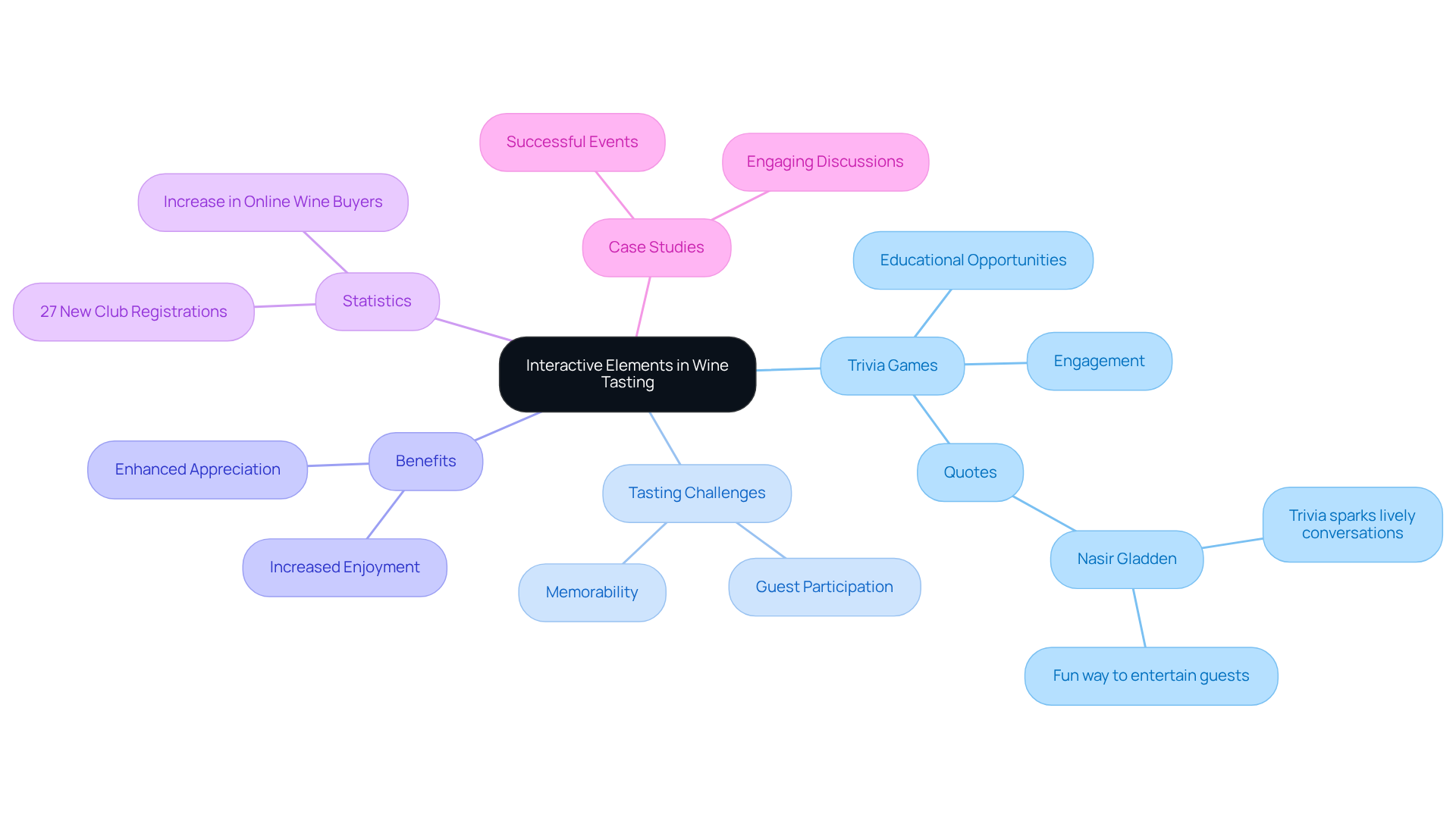
Share Wine Stories: Educate Guests on the Origins and Craftsmanship
Sharing the narratives behind beverages significantly enhances the wine tasting ideas. By informing visitors about the origins of the beverages, the vineyards, and the artistry involved in their creation, wineries can cultivate a more immersive environment. Exploring the beliefs of vintners and the distinct qualities of each beverage fosters a stronger bond between visitors and the drinks they are sampling. This narrative technique not only elevates the overall experience but also nurtures a deeper appreciation for the beverages.
Research reveals that 80% of consumers prefer brands that convey meaningful stories, which can profoundly influence purchasing decisions. Successful beverage sampling events frequently incorporate wine tasting ideas and narrative components, as evidenced by case studies from Georgian vineyards, where the rich captivates visitors and enhances brand loyalty.
By crafting stories that spotlight family customs, dramatic legacies, and the winemaking process, wineries can transform a simple experience into an unforgettable journey that resonates with visitors long after the occasion. Moreover, integrating strategic capital planning can assist family-owned wineries in sustaining growth, while Enocap's media placement and PR services can amplify these compelling narratives, driving sales and securing funding opportunities.
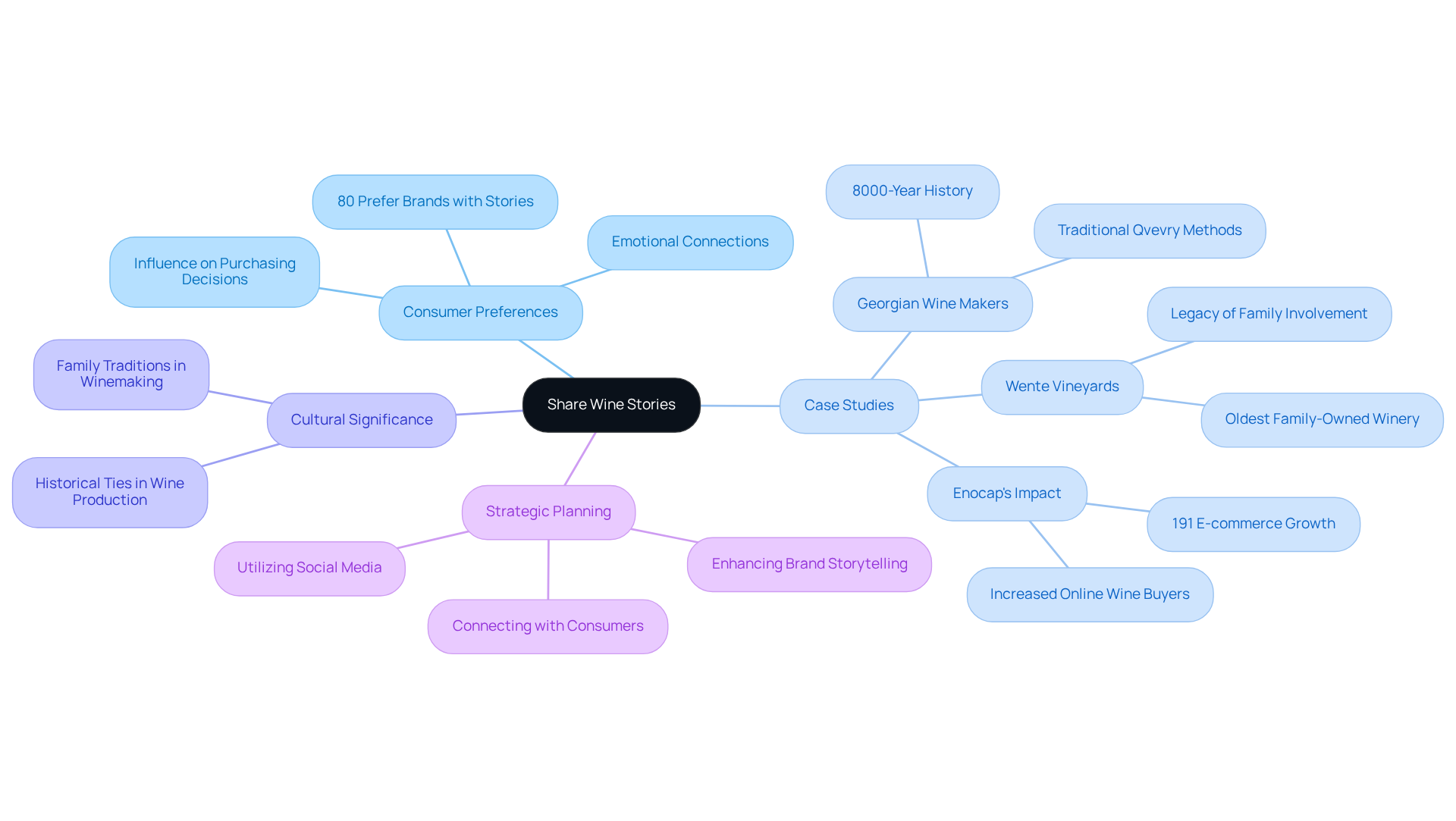
Leverage Social Media: Encourage Guests to Share Their Tasting Experience
Maximize the visibility of your tasting events by harnessing the power of social media. Motivate attendees to share their stories on platforms such as Instagram and Facebook by creating a distinctive event hashtag that embodies the spirit of the occasion. Enhance photo opportunities with visually striking backdrops or curated beverage displays, inspiring attendees to post about their experiences. Engaging with guests online not only fosters a sense of community but also generates excitement around your winery, ultimately attracting new customers and reinforcing brand loyalty.
Successful campaigns, like the one carried out by Napa Valley Winery, have demonstrated that wineries utilizing can greatly enhance customer relationships, making social media an essential tool in contemporary beverage marketing. As marketing expert John Doe states, "Building brand loyalty through social sharing is essential in today's digital landscape."
Furthermore, with 27% of new club signups coming from digital channels, the significance of social media in enhancing customer engagement cannot be exaggerated. By aligning these social media strategies with your strategic capital planning, you can ensure that your marketing efforts contribute to sustainable growth.
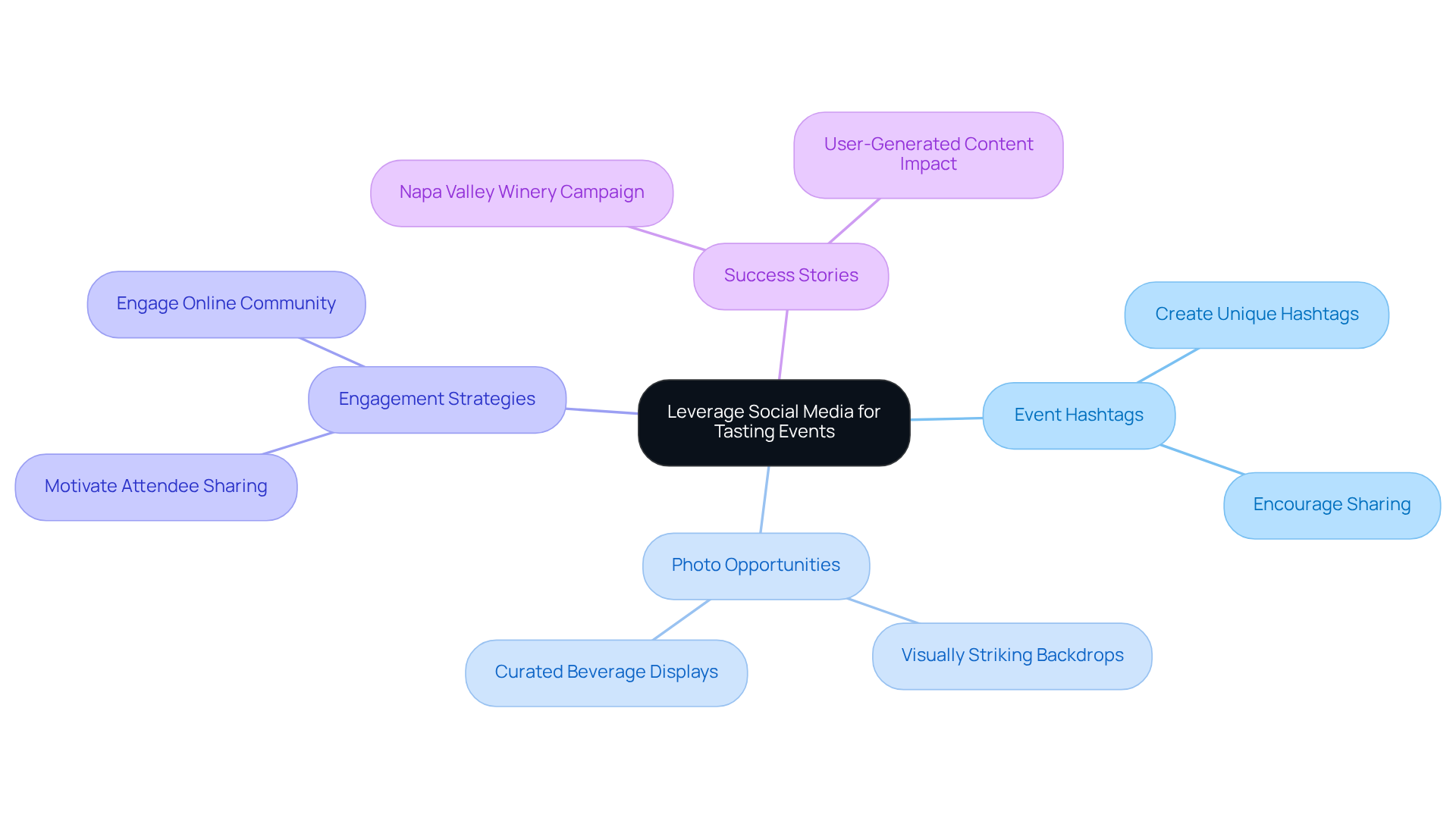
Provide Wine Tasting Kits: Allow Guests to Continue the Experience at Home
Offering beverage sampling kits for visitors to take home significantly enhances their enjoyment beyond the event, while also representing a revolutionary direct-to-consumer (DTC) strategy for family-operated wineries. These kits should feature a curated selection of wines showcased during the tasting, along with detailed tasting notes and food pairing suggestions that highlight the wine tasting ideas and narrate the story of your winery. This approach not only allows visitors to relive their experiences at home but also encourages them to share their feedback, thereby .
Notably, successful wineries like Muscardini Cellars have reported that these take-home kits not only bolster customer retention but also create memorable experiences that visitors cherish long after the event. Additionally, providing exclusive discounts for future purchases serves as a compelling incentive for visitors to return, thereby enhancing their loyalty and engagement with your winery.
As Rachael Martin aptly describes, the Joy of Wine Experience Home Tasting Kit is 'less of a hamper in the traditional sense and more of a box of the finest beverages you've ever tasted,' underscoring the appeal of these kits in crafting lasting impressions and driving consistent DTC revenue.
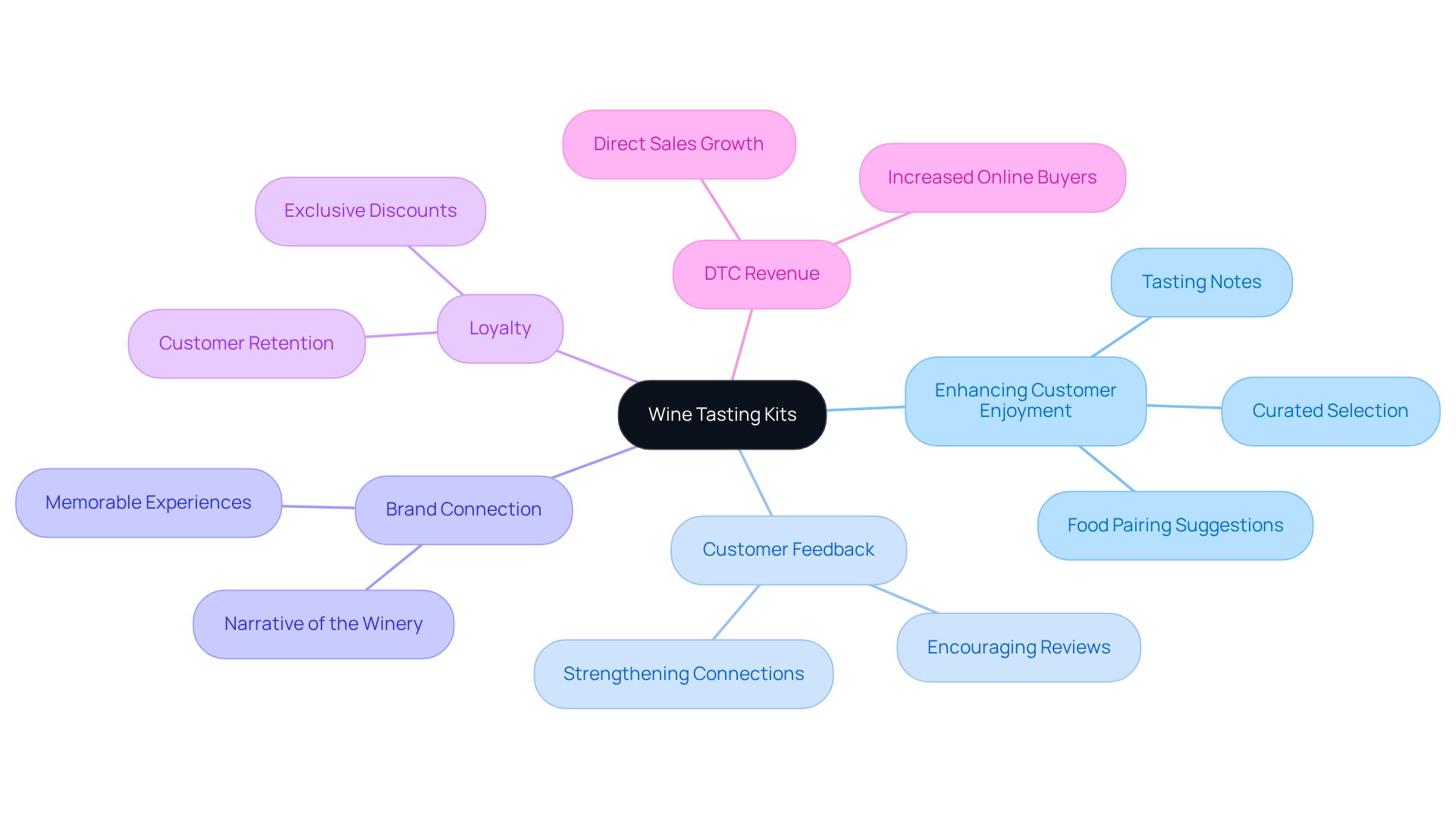
Plan Future Events: Create a Series of Wine Tastings to Foster Community
Organizing a series of wine tasting ideas is not merely an event; it is a strategic initiative that cultivates a sense of community among attendees while simultaneously promoting direct-to-consumer growth. By creating a calendar of events featuring wine tasting ideas along with diverse themes, varietals, or food pairings, you not only motivate visitors to return but also enhance their understanding and appreciation of beverages over time.
To further bolster customer retention and build a loyal following for your winery, consider implementing:
- Loyalty programs
- Membership discounts for repeat attendees
Leveraging Enocap's demand generation strategies and wine club optimization techniques can transform casual visitors into dedicated club members, ensuring your winery thrives for generations to come. Successful wineries have demonstrated that a well-structured event calendar featuring wine tasting ideas significantly enhances engagement and drives attendance, ultimately leading to increased sales and brand loyalty.
Conclusion
Elevating wine tasting events necessitates a multifaceted approach that prioritizes direct-to-consumer strategies and innovative experiences. By fostering personal connections with guests, wineries can craft memorable and engaging events that resonate deeply. Successful wine tastings transcend mere sampling; they encompass themed explorations, curated food pairings, and immersive storytelling that enrich the overall experience.
Key insights underscore the significance of:
- Creating inviting atmospheres
- Incorporating interactive elements
- Leveraging social media to enhance guest participation and brand visibility
From hosting themed tastings that explore regional varieties to offering wine tasting kits for home enjoyment, each strategy serves to deepen customer loyalty and engagement. Moreover, planning a series of events cultivates a sense of community, ensuring that attendees return for more unique experiences.
Ultimately, the value of these creative wine tasting ideas lies in their capacity to transform ordinary gatherings into extraordinary experiences. Wineries are urged to embrace these innovative strategies, not only to enhance their events but also to forge lasting relationships with their audience. By prioritizing consumer engagement and storytelling, wineries can thrive in a competitive market, inviting guests to savor not just the wines but the rich stories and experiences that accompany them.
Frequently Asked Questions
What are DTC strategies and why are they important for wineries?
Direct-to-Consumer (DTC) strategies are essential for wineries as they help foster direct relationships with consumers, creating personalized experiences that enhance customer engagement and loyalty.
How has Kathleen Inman successfully utilized DTC strategies?
Kathleen Inman of Inman Family Wines has effectively used virtual programs and corporate wine-tasting events to achieve 100% DTC sales over the past four years, demonstrating the power of tailored consumer engagement.
What benefits do wineries gain from implementing DTC strategies?
Wineries can collect valuable customer information, develop personalized wine tasting ideas, customize offerings, drive immediate sales, and cultivate long-term loyalty through DTC strategies.
What trend is observed in online wine buyers?
The number of online wine buyers has surged from 1.5 million to 4.1 million, highlighting the growing importance of DTC channels in attracting new consumers.
How can wineries enhance customer satisfaction through DTC channels?
Wineries can leverage platforms like Shopify to streamline operations, ensure compliance, and focus on authentic narratives and personalized marketing to create memorable engagements.
What are some thematic ideas for hosting a wine tasting?
Thematic ideas include focusing on regional varieties, exploring different vintage years, customizing themes for seasonal events, and incorporating food pairings to enrich the tasting experience.
How can food pairings enhance a wine tasting event?
Carefully selected food pairings can enhance flavors, create a more immersive experience, and promote dynamic interactions between food and beverages, ultimately enriching the tasting journey.
Can you provide an example of a successful food and wine pairing experience?
At Round Pond Estate, visitors enjoy a garden tour followed by a curated four-course pairing of food and beverages featuring seasonal ingredients, which strengthens connections to the beverages.
What role does storytelling play in food and beverage pairings?
Storytelling enhances the dining experience by connecting seasonal ingredients and flavors, as seen in the Pairing Dinner Series at Auro, which emphasizes the relationship between food and beverages.
How can wineries foster customer loyalty through wine tasting experiences?
By creating memorable experiences through personalized wine tasting ideas, engaging elements, and post-event follow-ups, wineries can enhance customer satisfaction and foster loyalty.




